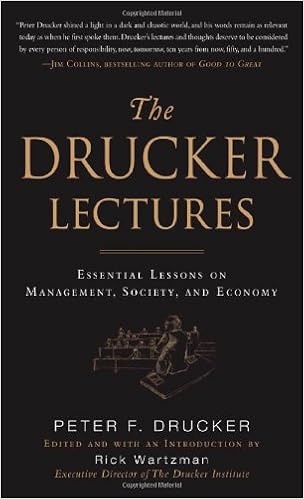This is part of the DR Book Collection.
 The late Peter Drucker (1909-2005) is one of the most influential management thinkers of all time as well as “the most cited management writer in the textbooks, exceeding that of Abraham Maslow, Max Weber, and Frank and Lillian Gilbreth…”[ref]Patricia G. McLaren, Albert J. Mills, Gabrielle Durepos, “Disseminating Drucker: Knowledge, Tropes and the North American Management Textbook,” Journal of Management History 15:4 (2009): 391.[/ref] His influence has been felt worldwide, particularly in Japan during the post-war boom.[ref]See also Chuck Ueno, “Peter Drucker’s Influence in Japan,” People and Strategy 32:4 (2009): 8-9. While the Clarke Professor of Social Sciences and Management at Claremont Graduate School, Drucker also lectured in Oriental Art at Pomona College and was appointed to the Board of the Asian Art Museum in San Francisco.[/ref] His outlook on management was that of a liberal art—“‘liberal’ because it deals with the fundamentals of knowledge, self-knowledge, wisdom, and leadership; ‘art’ because it is also concerned with practice and application.”[ref]Peter F. Drucker, The Essential Drucker (New York: HarperCollins, 2001), 13.[/ref] When Drucker was asked why he was turning his attention from corporate management to churches in his later years, he politely corrected them: “As far as I’m concerned, it’s the other way around. I became interested in management because of my interest in religion and institutions.” Drucker’s views on management, corporations, and the like were heavily influenced by his reading of Soren Kierkegaard. “Key to Kierkegaard’s philosophy (and to Drucker’s understanding of it) is the emphasis that Kierkegaard placed on living in the material realm.”[ref]Karen E. Linkletter, Joseph A. Maciariello, “Genealogy of a Social Ecologist,” Journal of Management History 15:4 (2009): 338.[/ref] Drucker’s search for existential purpose within the material realm of organizations can also be traced to his German intellectual and cultural background. Some researchers have viewed him as “a secularized German theologian” bucking against “‘the fall’ of modernity…”[ref]Madeline Toubiana, Gad Yair, “The Salvation of Meaning in Peter Drucker’s Oeuvre,” Journal of Management History 18:2 (2012): 179.[/ref] For many German scholars, “modernity meant an abandonment of tradition, coupled with a loss of meaning and faith…”[ref]Toubiana, Yair, 2012: 182.[/ref] Thus, Drucker believed that organizations and managers had “secularized theological duties; …moral duties in a world devoid of meaning[.]”[ref]Toubiana, Yair, 2012: 179.[/ref] In essence, work within an organization became a kind of worship; a way to tap into a higher purpose. As Drucker summarized,
The late Peter Drucker (1909-2005) is one of the most influential management thinkers of all time as well as “the most cited management writer in the textbooks, exceeding that of Abraham Maslow, Max Weber, and Frank and Lillian Gilbreth…”[ref]Patricia G. McLaren, Albert J. Mills, Gabrielle Durepos, “Disseminating Drucker: Knowledge, Tropes and the North American Management Textbook,” Journal of Management History 15:4 (2009): 391.[/ref] His influence has been felt worldwide, particularly in Japan during the post-war boom.[ref]See also Chuck Ueno, “Peter Drucker’s Influence in Japan,” People and Strategy 32:4 (2009): 8-9. While the Clarke Professor of Social Sciences and Management at Claremont Graduate School, Drucker also lectured in Oriental Art at Pomona College and was appointed to the Board of the Asian Art Museum in San Francisco.[/ref] His outlook on management was that of a liberal art—“‘liberal’ because it deals with the fundamentals of knowledge, self-knowledge, wisdom, and leadership; ‘art’ because it is also concerned with practice and application.”[ref]Peter F. Drucker, The Essential Drucker (New York: HarperCollins, 2001), 13.[/ref] When Drucker was asked why he was turning his attention from corporate management to churches in his later years, he politely corrected them: “As far as I’m concerned, it’s the other way around. I became interested in management because of my interest in religion and institutions.” Drucker’s views on management, corporations, and the like were heavily influenced by his reading of Soren Kierkegaard. “Key to Kierkegaard’s philosophy (and to Drucker’s understanding of it) is the emphasis that Kierkegaard placed on living in the material realm.”[ref]Karen E. Linkletter, Joseph A. Maciariello, “Genealogy of a Social Ecologist,” Journal of Management History 15:4 (2009): 338.[/ref] Drucker’s search for existential purpose within the material realm of organizations can also be traced to his German intellectual and cultural background. Some researchers have viewed him as “a secularized German theologian” bucking against “‘the fall’ of modernity…”[ref]Madeline Toubiana, Gad Yair, “The Salvation of Meaning in Peter Drucker’s Oeuvre,” Journal of Management History 18:2 (2012): 179.[/ref] For many German scholars, “modernity meant an abandonment of tradition, coupled with a loss of meaning and faith…”[ref]Toubiana, Yair, 2012: 182.[/ref] Thus, Drucker believed that organizations and managers had “secularized theological duties; …moral duties in a world devoid of meaning[.]”[ref]Toubiana, Yair, 2012: 179.[/ref] In essence, work within an organization became a kind of worship; a way to tap into a higher purpose. As Drucker summarized,
Management always lives, works, and practices in and for an institution, which is a human community held together by the bond that, next to the tie of family, is the most powerful human bond: the work bond. And precisely because the object of management is a human community held together by the work bond for a common purpose, management always deals with the Nature of Man, and…with Good and Evil as well. I have learned more theology as a practicing management consultant than I did when I taught religion.[ref]Quoted in Linkletter, Maciariello, 2009: 339.[/ref]
It is because of insights like these that I recently read through The Drucker Lectures: Essential Lessons on Management, Society, and Economy. The book is not a series of formalized essays or selections from published works, but delivered lectures and remarks spanning from the 1940s to 2003 (Drucker passed away in 2005). You get a sense of the consistent themes of his work, even as his philosophy evolved.
You can catch of glimpse of this in the short film below.
Would you recommend this an ideal starting point for someone who has never read anything by Drucker, or would you recommend another of his works?
The Essential Drucker.